 Petzlover
Petzlover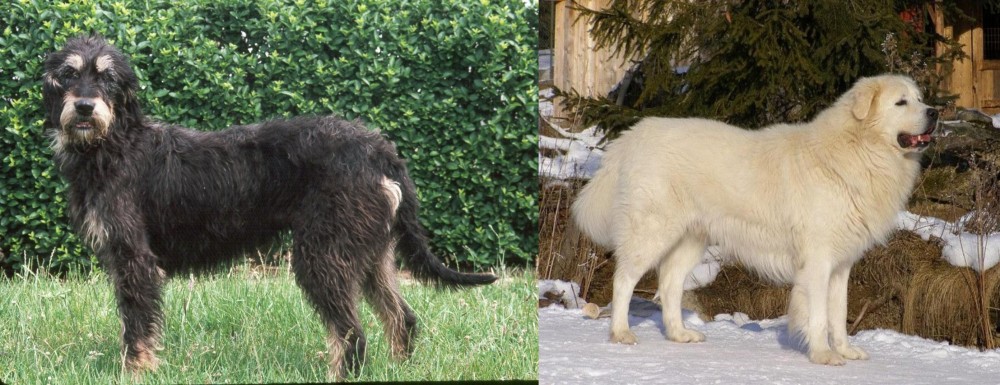 Griffon Nivernais is originated from France but Slovak Cuvac is originated from Slovakia. Griffon Nivernais may grow 8 cm / 3 inches shorter than Slovak Cuvac. Griffon Nivernais may weigh 19 kg / 41 pounds lesser than Slovak Cuvac. Both Griffon Nivernais and Slovak Cuvac has same life span. Both Griffon Nivernais and Slovak Cuvac has almost same litter size. Both Griffon Nivernais and Slovak Cuvac requires Moderate Maintenance.
Griffon Nivernais is originated from France but Slovak Cuvac is originated from Slovakia. Griffon Nivernais may grow 8 cm / 3 inches shorter than Slovak Cuvac. Griffon Nivernais may weigh 19 kg / 41 pounds lesser than Slovak Cuvac. Both Griffon Nivernais and Slovak Cuvac has same life span. Both Griffon Nivernais and Slovak Cuvac has almost same litter size. Both Griffon Nivernais and Slovak Cuvac requires Moderate Maintenance.
 The Griffon Nivernais is a working breed dog originating in France and used as a hunting dog because of his exceptional scent skills and his alertness with hunting.
The Griffon Nivernais is a working breed dog originating in France and used as a hunting dog because of his exceptional scent skills and his alertness with hunting.
The idea was to develop a dog that looked much like the hunting dogs of the Middle Ages. French noblemen kept these dogs but the breed disappeared somewhat after the French Revolution, being restored again in 1925.
The restoration of the breed was done based on the Grand Griffon Vendeen but other breeds were also used such as the Otter- and Foxhounds. The breed has yet to receive official recognition by the AKC but it is recognized by both the FCI and the UKC.
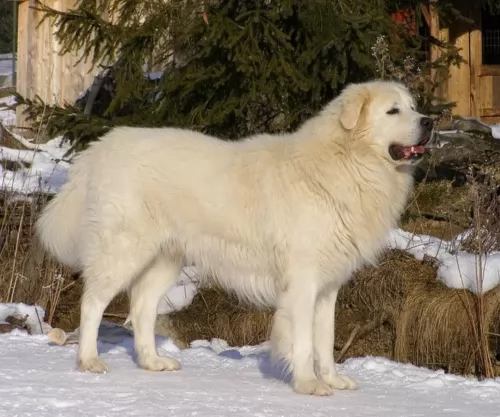 Looking quite a bit like the Pyrenean Mountain Dog, the Slovak Cuvac is a large dog that has served as a guard dog. The Slovensky Cuvac is still used on sheep farms as he isn’t afraid of wolves and bears and will take them on if needs be.
Looking quite a bit like the Pyrenean Mountain Dog, the Slovak Cuvac is a large dog that has served as a guard dog. The Slovensky Cuvac is still used on sheep farms as he isn’t afraid of wolves and bears and will take them on if needs be.
Records of this dog have been kept since the 17th century already, and when the breed started dying out, a certain Dr Antonin Hruza put in efforts to revive the dog.
The registered breeding of the Slovensky Cuvac was established in Czechoslovakia and a club for the dog was established in 1933. A written standard was established in 1964. The dog is not recognized by the Fédération Cynologique Internationale.
 As a medium sized dog, the Griffon Nivernais stands at 55 to 62cm in height and weighs between about 22 and 25kg.
As a medium sized dog, the Griffon Nivernais stands at 55 to 62cm in height and weighs between about 22 and 25kg.
He is recognized easily by his distinctive rough or shaggy coat which is a grey with fawn around the muzzle and legs. Other colors can be black and fawn. Sometimes this blend of colors gives him a grizzled look in appearance.
He is also noted for the hairy eyebrows, a beard and mustache. He has dark brown eyes, black nose, long floppy ears and a tail that is held upright and with a slight curve. He is a muscular dog with a deep chest and a slight arch in the back.
Stubborn, courageous and independent, the Griffon Nivernais is a hunting dog with amazing scenting abilities. He is a dog used to working in a pack with other dogs so he tolerates other dogs well. He is a friendly dog, getting on well with children as well.
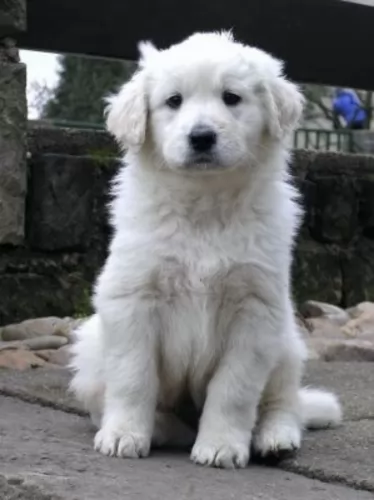 This is a large dog standing at between 59 and 70cm in height and weighing between 31 and 44kg.
This is a large dog standing at between 59 and 70cm in height and weighing between 31 and 44kg.
The neck is broad and has quite a bit of fur around it. The head is large, the eyes dark brown, the double coat is white and thick and medium length. The eyes are brown, the ears medium length and floppy and the tail long and furry.
This is a robust dog, used to spending time outdoors keeping watch over livestock. When he is invited into the home, he is gentle and well behaved, more so when he has been trained and socialized.
He is loving and loyal towards his human family and will get on well with children in the home. He isn’t the brightest dog but you can still have him trained.
 Your Griffon Nivernais is a sociable, stubborn, independent dog who loves to be around his human family members.
Your Griffon Nivernais is a sociable, stubborn, independent dog who loves to be around his human family members.
Socialization and training will do him good and round him off, making him obedient and responsive to your commands. He isn't an aggressive dog, but is even tempered and confident.
Exercise him well, feed him quality food, give him a nice warm, dry place to sleep, just like any other family member of yours, and you'll be rewarded with the companionship of a faithful, loving friend.
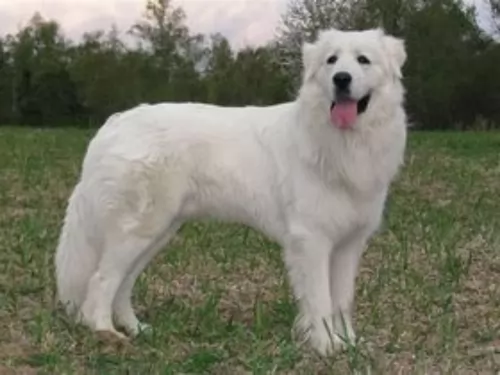 Your playful Slovak Cuvac is an affectionate dog, wanting nothing more than to be totally involved in his family’s life.
Your playful Slovak Cuvac is an affectionate dog, wanting nothing more than to be totally involved in his family’s life.
He is social and loving and also makes an excellent watchdog. He’s a big dog so think carefully before you bring him into your home. Many dog owners like the look of a big dog and forget that it costs a lot of money to feed a big dog and to pay for vet fees.
This big dog is wanting to be part of your family and not just to be discarded when you find that he is costing you too much.
 The typical lifespan for your Griffon Nivernais is 10 to 14 years. Even though you're highly unlikely to spend much time with him at the vet, there are one or two common dog illnesses worth knowing about -
The typical lifespan for your Griffon Nivernais is 10 to 14 years. Even though you're highly unlikely to spend much time with him at the vet, there are one or two common dog illnesses worth knowing about -
It is the fate of many dogs with floppy ears that they are prone to developing ear infections. You may notice him shaking his head canine, his ears may be red and there could even be a discharge.Get him to the vet as ear infections can be promptly treated with a course of medication.
Remember to have your Griffon Nivernais puppy vaccinated at 6 weeks of age. Puppies are vulnerable to horrible diseases which can sap the very life from them. These diseases are distemper, canine hepatitis, parvovirus as well as rabies. The puppy’s first vaccinations should be at 6 weeks of age followed by a second vaccination 2 to 4 weeks later.
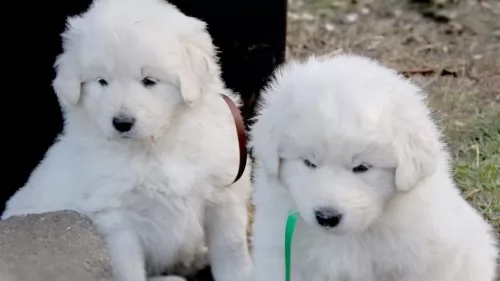 This is a healthy dog breed, but as with many large dogs, hip dysplasia is a threat. Hip dysplasia is always reason for concern as the condition can reduce a dog’s quality of life.
This is a healthy dog breed, but as with many large dogs, hip dysplasia is a threat. Hip dysplasia is always reason for concern as the condition can reduce a dog’s quality of life.
It is distressing seeing your once active pet becoming reluctant to play and move around.
Canine hip dysplasia is a common skeletal condition. It can strike any size dog but is more prevalent with large dogs. The ball and socket of the hip doesn’t fit properly and deterioration sets in resulting in loss of function of the joint.
You will need to get your dog to the vet who will perform a physical exam and discuss treatments to alleviate the pain your dog can experience.
 This breed needs to be walked daily, and he needs a large space to run and play. Take him on walks, to the park, or give him a good game with ropes and balls.
This breed needs to be walked daily, and he needs a large space to run and play. Take him on walks, to the park, or give him a good game with ropes and balls.
In spite of his long, shaggy coat, the Griffon Nevernais doesn't need any special grooming and his shaggy coat will require brushing twice a week to remove loose hairs. When you brush him, you can also check for fleas and ticks.You get special flea combs for this. You can speak to your vet about recommendations too.
Because his coat is of a harsh texture it doesn't tangle or matt. Bathing will only be necessary when he becomes super dirty as too much bathing removes natural oils. He will need to have his nails trimmed if they don't wear down naturally, and he will also need to have his ears cleaned to keep them free of wax and dirt and to prevent ear infections.
Brush his teeth 2 or 3 times a week will also help towards preventing dental disease.
He is a high energy dog so he will need to get top quality food. You can feed him the best commercially manufactured food but its to his advantage to include some home-made food too such as cooked chicken, brown rice and vegetables. He'll also need some raw meat from time to time and a constant supply of fresh, cool water.
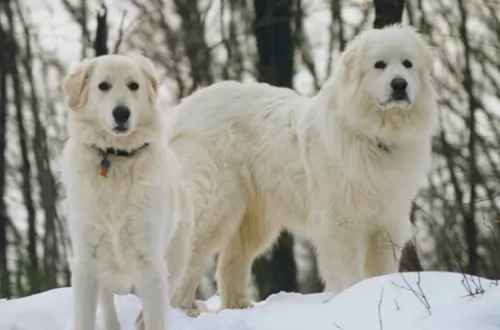 ◆The thick white hair will require regular grooming to keep it free from burrs and dirt. He sheds so this brushing will help him to look more groomed.
◆The thick white hair will require regular grooming to keep it free from burrs and dirt. He sheds so this brushing will help him to look more groomed.
◆The nails should be trimmed regularly and the ears too should be checked for redness and infection. You’ll need to look inside his mouth too as a rotting tooth can cause havoc within his body. A rotten tooth can also cause him tremendous pain and he has no way of telling you this.
◆Have your pet spayed or neutered if you don’t want any puppies. This is better for your dog’s health in the long run too.
◆Your Slovak Cuvac is going to need a lot of exercise as they have always been used to roaming the mountains watching over livestock.
◆This is a big dog so if you buy commercially manufactured food, make sure its for large, energetic dogs. There are good commercially manufactured dog foods on the market – just make sure you buy the best one for your pet to enhance health and longevity.
Try and give him some home made food too. Healthy food which won’t jeopardise his digestion is boiled chicken, brown rice or pasta and spinach, sweet potatoes and carrots. These can all be chopped up and small portions mixed into the dry kibble twice a week as a treat.
Try and include some raw meat occasionally. Your dog will thank you for not giving him exotic people foods which can do lots of harm. Ensure there is always a bowl of fresh, cool water within his reach.